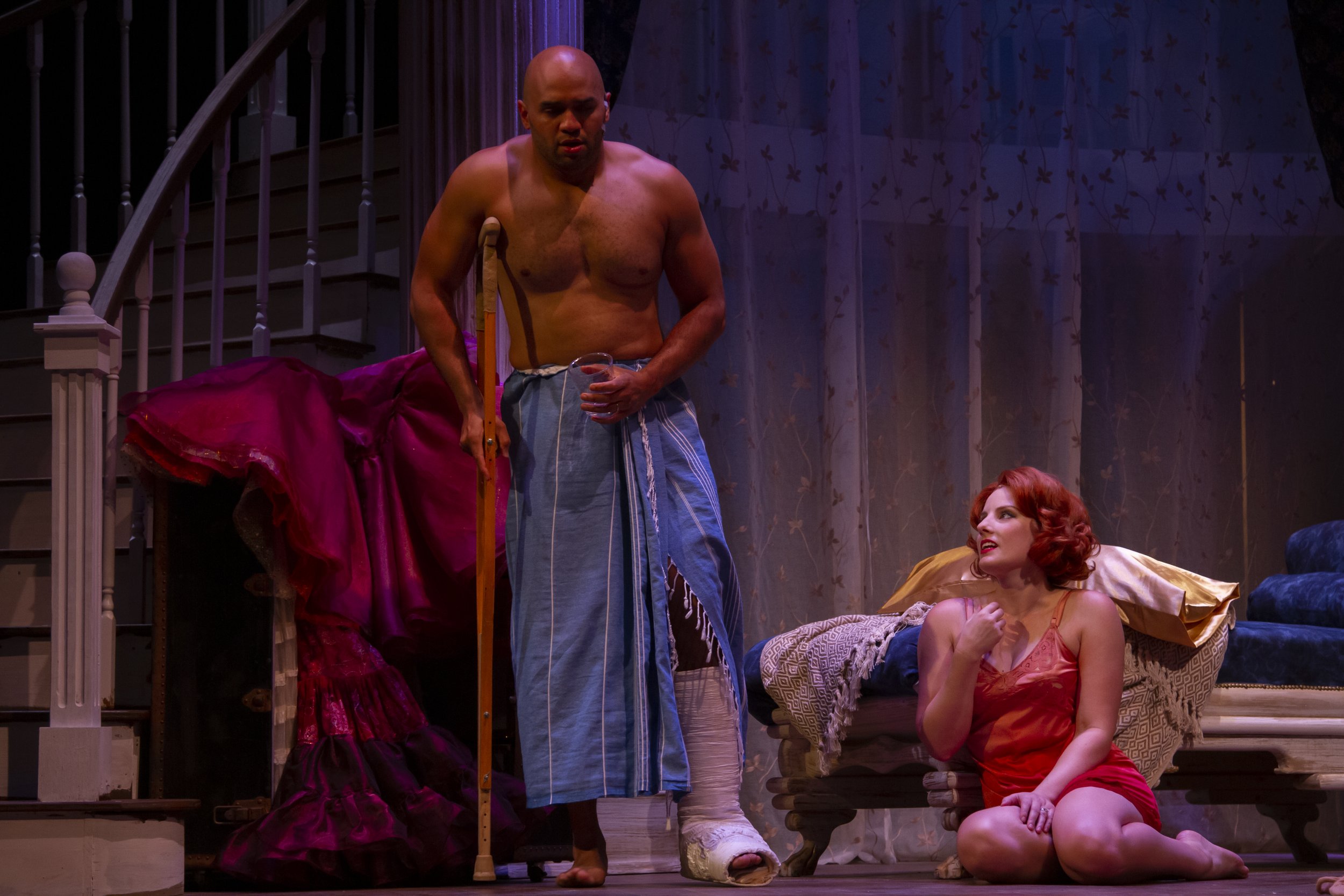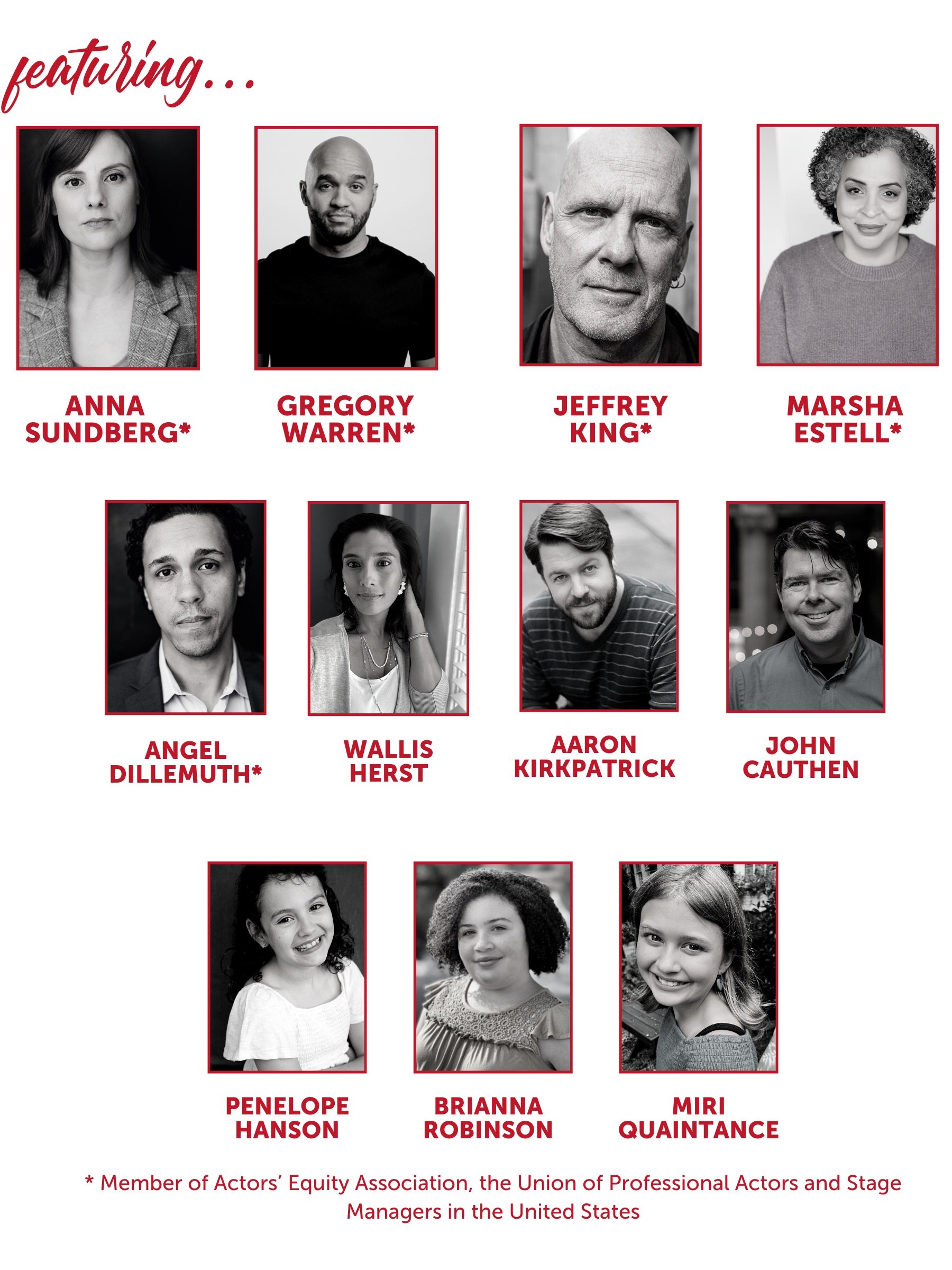By Page Laws Correspondent
A lot is being done with smoke and mirrors in downtown Norfolk. “Wicked,” a hugely profitable, trucked-in show, has been using smoke and mirrors to successfully sell high-tech magic at Chrysler Hall; meanwhile, a ew blocks away, the Virginia Stage Company (nonprofit, everything made on site) is using mirrors and smoking-hot acting to conjure its long-delayed offering of Tennessee Williams’ “Cat on a Hot Tin Roof.”
Though antithetical in style and production, both are see-worthy shows. But back to that mirror held up to life over at the VSC. Perhaps because the COVID-19 wait was so long (going on three years), what might have been a normal-sized mirror grew into a giant soul reflector, hung beneath the new Wells fly loft, thankfully installed during the hiatus. Director Khanisha Foster, who in 2019 helmed the VSC production of the now-controversial play “The Bluest Eye,” and her then-as-now set designer Josafath Reynoso, have slanted the giant mirror just so, in order to reveal to the audience a big brass bed plus any occupants therein.
The problem is, of course, that Maggie the Cat (Anna Sundberg plays the famous feline as a feisty redhead) can’t get her hobbling, boozing husband Brick (Gregory Warren) interested in any bed action, least of all with her. As Big Mama (Marsha Estell) later says, pointing to the bed, “When a marriage goes on the rocks, the rocks are right there.” Maggie’s frustrated; Brick is bombed; and Big Daddy, though he’s been lied to about it, is riddled with cancer. Human vultures (such as a minister, palm outstretched) are gathering.
Williams re-creates this Southern Gothic marital shipwreck by psychoanalyzing one of the great dysfunctional families of American theater. Besides Maggie and Brick and Brick’s never-seen-but-alwayspresent dead best friend Skipper (gay in an era of zero tolerance), we have well-meaning matriarch Big Mama; wife-bullying patriarch Big Daddy (Jeffrey King, in a remarkable performance); Brick’s rightfully resentful older brother Gooper (Angel Dillemuth); Gooper’s wife, Mae, aka Sister Woman (Wallis Herst); and three of Gooper and Mae’s “noneck monsters” (children, in Maggie-speak), one of whom, Trixie (Miri Quaintance), bears a sneaking resemblance to her stage mother, Herst. (Hint: they are also related offstage.)
Without the 25 plays of Thomas Lanier (“Tennessee”) Williams III (1911-83), Broadway might have long ago shut down, and the same is true for the Hollywood studios that churned out all those outrageous film adaptations. Many people who think they know the play are remembering the Hollywood-censored 1958 film starring slip-clad Elizabeth Taylor as Maggie, dreamy Paul Newman as Brick, and burly Burl Ives as Big Daddy.
Purge those portrayals from your mind, however, for director Foster’s highly theatrical, concept-driven version, beginning with her casting of actors of color in the traditionally white roles of Brick, Big Mama, Gooper and Sister Woman/Mae. Foster is forthright about her interest in race and quick to point out her own background: “I am the daughter of a Black Panther father and a white mother whose family invented Bubble Wrap,” she says in the playbill. (Bubble Wrap? That fortune likely makes Big Daddy’s $10 million look like chump change.)Foster indicates that the play clicked for her (note Brick’s sought-after “click” in the play) when she learned the story of Strom Thurmond’s forbidden love for a Black woman. That liaison produced a daughter whom the longtime U.S. senator quietly kept up with all his days. When this daughter’s Black mother died, however, Thurmond began his segregationist assault on Black rights. That displacement of thwarted love into destructive rage against innocents is what’s occurring in the play, Foster suggests in the playbill, a concept that guided her direction.
Now “clicks” are a personal thing, and, although I can’t identify with Foster’s inspiration, it has engendered strikingly unified results. They are clear in Reynoso’s flamboyant, ultra-classical set design: Greek columns, sweeping colonnade and double staircase, billowing long gauzy curtains, and, of course, the truth-telling mirror. It all adds up to surreal nouveau riche excess. My only suggestion for remodeling would be to add the ’50s equivalent of a Jacuzzi. The small bathtub behind a screen seems a bit déclassé.
Foster’s sound design, by Steven Allegretto, follows surreal suit by spookily echoing the offstage sound of a croquet ball being struck, as if to presage doom. Allegretto’s sonically conveyed thunderstorm is also apocalyptic. Costumer Bryce Turgeon must have also been told to succeed by excess. His glittering, Indian-inspired maternity suit for Herst is so beautiful, however, it makes it hard to concentrate on what Sister Woman (generally played as just drab and pregnant) is saying to increase her future fortune. Her husband Gooper is likewise costumed in a suit so outré that Dillemuth is lost behind its stripes. Not to be outdone, Maggie wears an orange ombré slip. Did they even do ombré in the ’50s?
Still, the whole is greater than any slip, and Big Daddy and Brick, both of them unremarkably costumed, raise the roof with their visceral acting, a choreographed dance of mutual pain and repression. In the first act pasde- deux of hate and avoidance with Maggie, Warren’s Brick comes across as a bit stolid. Shakespeare veteran Jeffrey King — 20 seasons with the Oregon Shakespeare Festival — comes playfully bouncing across the brass bed in Act 2, and elevates the acting of the whole cast, but especially that of Brick. The audience notes that Big Daddy is punished for his bed-jumping stunt by an attack of pain so fierce he can scarcely conceal it.
A famous, eventually out gay figure in real life, Williams was capable in his great works of crazy excess and careful craftsmanship. Foster respects and conveys both. Known for his directorial stage directions, Williams insisted that the characters we so dislike also be human beings with whom we can empathize. Even the egotistical, racist, philandering Big Daddy, so brutal to his long-suffering wife (played by Estell as a little dim but never oblivious) earns a modicum of sympathy via his physical suffering, but also through his surprising tolerance for Brick, whom everyone suspects of also being gay. Big Daddy is on to the Southernfried liars who surround him (“Mendacity, mendacity!”), including his eldest son Gooper, armed with a corporate law degree and fecund wife. Mae is equally insistent that her husband and ill-behaved gaggle of children (plus one in the oven) should rate higher than the family favorite, Brick the lush and his childless, ill-tempered wife.
Maggie, besides being catty, has estranged Brick by sleeping with poor Skipper. (“We made love to each other to dream it was you.”) That’s projection/displacement, all right: Foster’s concept in action. The director concludes her playbill remarks with a provocative invitation: “Now, let’s tell some family secrets.” And that she does, with the help of that provocative, bawdy-house mirror.
You can safely jump off that hot tin roof now, Maggie. This production ensures you’ll always land on your feet.
Page Laws is dean emerita of the Nusbaum Honors College at Norfolk State University. prlaws@aya.yale.edu














